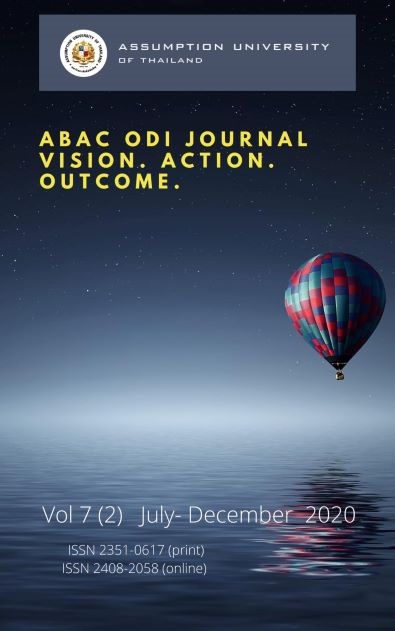Identifying the Factors to Enhance Training Effectiveness: A Case Study of KNGY Teacher Volunteers, Myanmar
Keywords:
training effectiveness, training needs assessment, training contents, self- efficacy, supervisory support, transfer of knowledgeAbstract
The purpose of this study is to determine the current situation of the KNGY training program and to provide strategies for an enhanced training program in terms of training needs assessment, training contents, self-efficacy, supervisory support, and transfer of knowledge. The researcher used quantitative and qualitative approaches to gather data and information. The researcher distributed questionnaires to 76 teacher volunteers of KNGY, Myanmar. The researcher also interviewed eight staff from the management team. In this study, the data were analyzed by using the mean score, Pearson correlation, and multiple linear regression from SPSS to examine and determine the effect of the factors on training effectiveness. The qualitative analysis was based on interaction, keywords, and phrases and come up with common themes. The quantitative and qualitative data analysis is examined together for discussion. The result of the survey revealed that training needs assessment, training contents, self-efficacy, supervisory support, and transfer of knowledge positively relate to training effectiveness. Among them, the supervisory support was found to be a significantly important dimension in affecting training effectiveness with the highest mean of 4.16 and .713 of Std. Deviation and its allies with the qualitative result on the dimension of supervisory support that provides required support, feedback, coaching, and mentoring. The results and discussion from the research study will add value to the training managers who coordinate and design the training program in order to enhance the effectiveness of the KNGY training program in the future.
References
Alan Barrett and Philip J. O'Connell (2001). Does Training Generally work? The Returns to in Company Training. ILR Review, 54, (3), 647-662
Baldwin, T. and Ford, J. K. (2008). Transfer of training: a review and directions for future research. Personnel Psychology, 41, 63-105
Barkala, M. F., Martin, A.D., & Gutierrez, F. T. (2000). Training in retailing: A guide for improving the supply of courses. International Journal of Retail & Distribution Management,28(6), 243-260.
Chen, C., Sok, P., & Sok, K. (2007). Exploring Potential Factors Leading to Effective Training. Journal of Management Development, 26(9), 843-856.
Debra L. Worthington PhD (2008). Communication Skills Training in a Hospice Volunteer Training Program. Journal of Social Work in End-of-Life & Palliative Care, 4:1, 17-37, DOI: 10.1080/15524250802072021
Holton, E. F., Bates, R. A., & Ruona, W. E. (2000). Development of a generalized learning transfer system inventory. Human Resource Development Quarterly, 11(4), 333-360.
Jayawardana, A. K. L., &Prasanna, H. A. D. (2007). Factors affecting the effectiveness of training provided to merchandisers of Garment Industry in Sri Lanka. Sri Lankan Journal of Management, 1-15.
Khalid, K, Eldakak, S.E & Puteh, F. (2017).The effect of self-efficacy, OJT and classroom training on training effectiveness in Malaysian Construction Industry. Journal of Engineering and Applied Sciences.
Khalid, K, Eldakak, S.E & Puteh, F. (2017).The effect of self-efficacy, OJT and classroom training on training effectiveness in Malaysian Construction Industry. Journal of Engineering and Applied Sciences.
Khan, I., Mufti, S., & Nazir, N. A. (2015). Transfer of training: A reorganized review on work environment and motivation to transfer. International Journal of Management, Knowledge and Learning, 4(2), 197-219.
Lin, Abdullah and Sharif, Mohmad Yazam (2008). Factors affecting training effectiveness. A study of semiconductor wafer fabrication industry in Malaysia. In: 4th National Human Resource Management Conference 2008, 17-19 August 2008, Tiara Beach Resort, Port Dickson.
Madagamage, G. T., Warnakulasooriya, B. N. F., &Wickramasuriya, H. V.A. (2014). Factors influencing motivation to transfer training: an empirical study of a government sector training program in Sri Lanka. Tropical Agricultural Research,26(1),12-25.
Otuko, A. H., Chege, K., & Douglas, M. (2013). Effect of training dimensions on employee’s work performance: a case of mumias sugar company in Kakamega County. International Journal of Business and Management Invention, 2(9), 138-149.
Poon, J.M.L. and Othman, R. (2000). Management training and development practices of Malaysian organizations. Malaysian Management Review, 77 -85. Retrieved from https://home.kku.ac.th/sompong/guest_speaker/KrejcieandMorgan_article.pdf
Profijt, J. (2015). The influence of the work environment on training transfer. Unpublished master thesis. Universityof Twente.
Shariff, N. B. M., & Al-Makhadmah, I. M. (2012). Work environment factors influencing in achieving training effectiveness in Aqaba Special Economic Zone Authority Aseza. Academic Research International,2(3), 598.
Sharma, P., & Sharma, R. (2016). Impact of Continuous Learning Culture and Self Efficacy on Training Effectiveness: Empirical Evidence from Insurance Sector in India. Global Journal of Management and Business Research.
Siengthai, S., Boonkrob, D., & Siengthai, M. (2016). Evaluation of training effectiveness: A case study of the ministry of interior, Thailand. Reseach Journal Business & Management.
Trang, D (2014). Training affects the employee’s performance. International university- Vietnam national University HCMC.
Wagonhurst, Carole. (2002). Developing Effective Training Programs. Journal of Research Administration, 33(2),77-81.
Wankhede, M., Nagy, & Gujarathi, R. (2014). Training effectiveness: An evaluation. Asian Journal of Management Science,2(2), 01-07.
Wexley, K. and Latham, G. (2002), “Developing and training human resources in organization,” Upper Saddle River, NJ: Prentice Hall 3rd Edition.
Williams, S., Graham, S., & Baker, B. (2003). Evaluating outdoor experiential training for leadership and teambuilding. Journal of Management Development, 22(1), 45-59.



